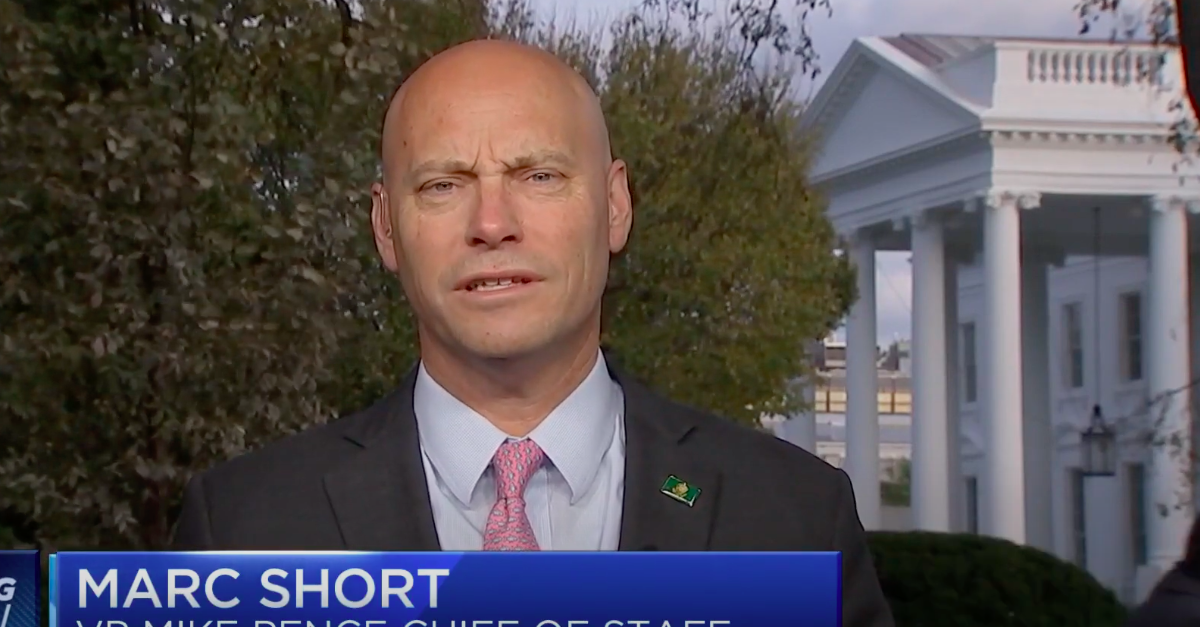
Marc Short, Chief of Staff to Vice President Mike Pence
For months, Vice President Mike Pence’s chief of staff Marc Short has been serving on the White House’s coronavirus response task force while simultaneously maintaining his stock holdings in several companies that present clear conflicts of interest and may violate federal conflict of interest laws, NPR reported Thursday.
According to the report, Short owns between $506,043 and $1.64 million worth of individual stocks in companies that are actively involved in the Trump administration’s coronavirus response.
The holdings, which are jointly owned by Short and his wife, include manufacturers of drugs, medical tests, medical devices, medical instruments, personal protective equipment (PPE), cleaning supplies, and antiseptics. The companies? CVS, Thermo Fisher Scientific, Walmart, and Roche, all of which have been publicly championed by Trump administration officials, including President Donald Trump himself at various coronavirus task force briefings.
During a March 13 Rose Garden press conference, President Trump specifically singled out Roche as a “great company” before allowing its chief executive officer Matthew Sause to speak at the podium where he touted Roche’s bright future.
The conflicts of interest were first flagged last month by government watchdog group Citizens for Responsibility and Ethics in Washington (CREW), but the organization was unable to confirm whether Short had divested from those holdings. However, in a statement to NPR, Pence spokesman Devin O’Malley confirmed that Short had sought a Certificate of Divestiture from the Office of Government Ethics (OGE) – which was denied – before deciding not to divest from the companies. Certificates of Divestiture allow government officials to offset the tax burden of selling assets deemed to be conflicts of interest with their public work; merely applying for the certificate requires that officials attest to having a possible conflict and is itself “an acknowledgement that the likelihood of potential conflicts of interest exist,” according to the report.
“Marc Short has followed all applicable ethics laws, and even sought to divest from potential financial conflicts,” O’Malley said in a statement to the news outlet.
“There has to be an underlying conflict of interest, and OGE has to determine that there is, in order to even be eligible for a certificate,” Don Fox, a former general counsel and acting director for the Office of Government Ethics (OGE), told NPR.
Former OGE Director Walter Shaub, who resigned from that position months after Trump’s inauguration, said the fact that Short applied for a Certificate of Divestiture amounts to an admission that a conflict exists, regardless of whether or not the application is approved.
“You can only seek a Certificate of Divestiture when your office says a stock is a conflict of interest,” Shaub wrote. “That means we have what amounts to an admission by the government that he holds stocks that pose conflicts of interest and, under the regulation, it is ‘reasonably necessary’ to sell them. That’s HUGE! You rarely get that kind of admission. You have it in this case.”
https://twitter.com/waltshaub/status/1265991773547048960?s=20
“[NPR reporter Tim Mak] reports that OGE denied a CD (i.e., the tax break) because Short wouldn’t be selling off all of the stocks. He doesn’t appear to have sold those he could sell. That’s a problem. The regs require a person seeking a CD to promise to divest whether OGE issues a CD or not!” he continued.
Shaub, who’s been a regular critic of the Trump administration since he left it, also said Short’s conflicts of interest are a “major scandal” and said the FBI “must investigate” the situation.
[image via CNBC screengrab]